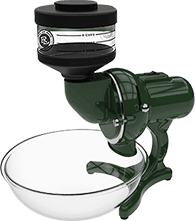For many people, the kitchen is the main room of their house. It’s the room most often visited, and many gatherings end up congregating in the kitchen. Simply, food brings people together, and the kitchen is where all the food is. But really, the kitchen offers more than just food. Within the mix of ingredients, pots and pans and delicious aromas, we can also find discovery, experimentation, and memories; time to think and reflect or catch up with friends and family over a simmering stove or baking oven.
These things, of course, don’t happen so much when popping something into the microwave. Discovery, experimentation and memories depend on the process of making food. There’s something about gathering ingredients, playing around with recipes, and watching a concoction come to life that inspires deeper thinking, conversation, and ultimately, a world of taste to experience. To make your own food is an opportunity for a richer life.
Unfortunately, cooking from scratch can seem daunting to those who don’t usually do it. The food industry has made it very easy for people to just buy ready-to-eat meals, eat whatever it is that they contain and never really get personally involved in the process. Yes, it’s easy and convenient, but you’re also missing out on some important things.
For one, consider nutrition. There is an abundance of information about how processed food lacks nutrients and provides too much of “the bad stuff” – preservatives, additives, sugar, sodium, etc. There is also a wealth of information on how eating whole food provides a variety of benefits to keep you healthy. It’s Convenience vs. Health. In the battle of how we eat, it’s often an easy win for convenience. Unfortunately, packaged and processed food doesn’t give you many taste or nutrient options. It’s all or nothing. Processed food decides which ingredients you do or don’t eat, and most of the ingredients it includes, like corn syrup, sodium benzoate, sodium nitrates and artificial colors, are just not good for us. However, the more you become involved in making your own food, whether it be making a salad, cutting vegetables for a side dish or baking bread, you’ll begin to realize that you can have control over your food, both in its nutrient content and how it tastes.
The activity of making food also provides benefits beyond just food. If you’re cooking for one, it can be an exercise in creativity as you think up different ingredient combinations that might taste really good. You can daydream about any number of things while you’re waiting for food to finish cooking. In our busy lives, finding a moment to stop and reflect can be difficult, so the chance to pause and think is a nice perk of cooking. Just don’t daydream to the point of burning anything! As you cook, the different smells and activity can inspire memories from different times in your life – favorite foods when you were young, learning to cook, and time with family. Cooking food can bridge the past and the present in wonderful ways. And then you get to taste and enjoy what you made, knowing that it was made using your intuition, creativity, and your very own hands, which feels pretty satisfying.
If you’re in the kitchen with someone else, it’s an opportunity to collaborate, to learn more about what the other person likes and what their style and strengths are. It’s also simply a time for good conversation, catching up on what’s been happening in each other’s lives, or making plans for the future.
If you’re with kids, it’s a great opportunity to show them the wonder of food and cooking. They’ll learn that a whole world of good flavors can be explored, and that they have the ability to make something exactly how they want it. This can be an empowering experience that they remember for a long time. Can you remember one of these kitchen experiences from when you were young?
If you think you don’t have time for cooking, consider that it’s maybe not so much an issue of time, but that you’ve been sold on the convenience of processed food. Think more about what you might be missing out on and use that as encouragement to find the time to experience the things that cooking offers.
If you think you don’t know enough about how to cook, for one, remember that you’re not testing to be a professional chef. Start slowly and grow at your own pace. There are tons of resources, recipes and information available to help you learn, as well as the simple improvisation you can try on your own. After all, learning by doing has the best results.
So, explore that main room in your house, the one you visit so often. You’ll find that the kitchen is a lab, a workshop and a place of comfort. It’s where you can make food based on your mood and taste, provide you and your family important nutrients, develop your own recipes, and ultimately, make things that you feel very good about.
References:
http://www.huffingtonpost.ca/2013/04/17/worst-toxic-food-ingredients_n_3101043.html

